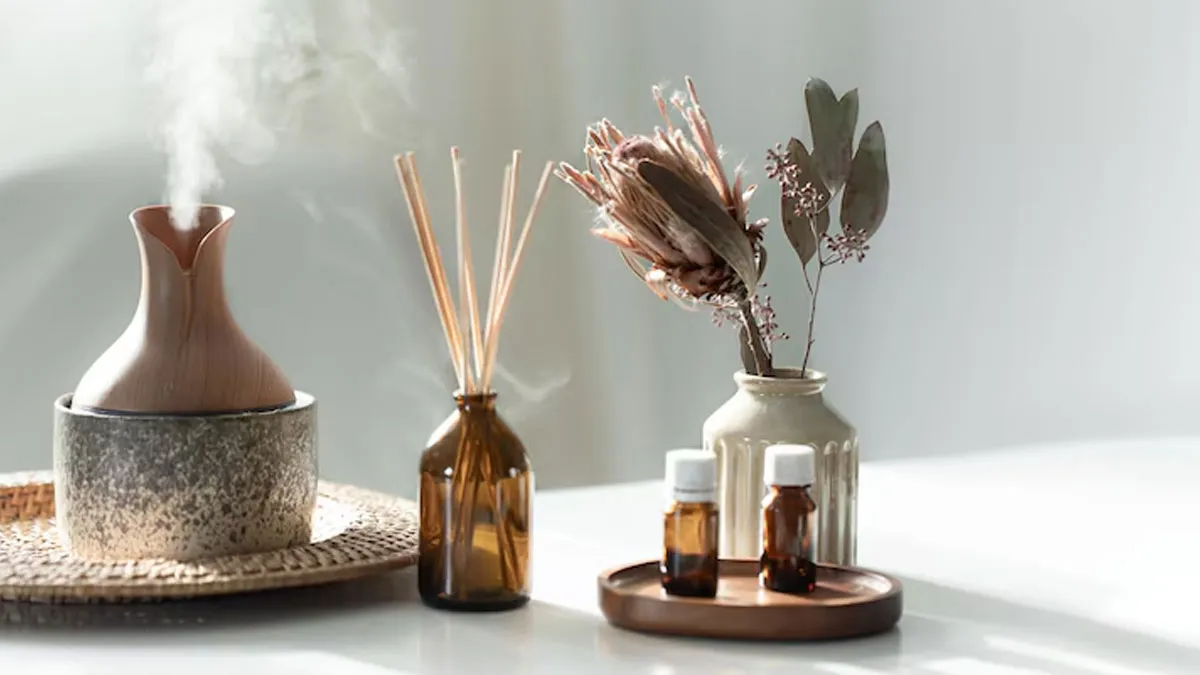
Scented candles and incense sticks are often used to create a calming atmosphere and add fragrance to homes. However, they might be doing more harm than good. We spoke to Dr Sanggita Checker, Consultant Chest Physician at Wockhardt Hospitals, Mira Road, who explained how these products can impact air quality and offers practical tips to maintain clean, breathable air at home.
Many people light scented candles and incense sticks to enhance the fragrance and ambience of their homes. However, according to Dr Sanggita Checker, this common practice could be harming your health. "People often light scented candles and incense sticks to improve indoor air quality. But it does the opposite of it. It can significantly release harmful particles and chemicals into the air," she explains.
These products release tiny particles and volatile organic compounds (VOCs) into the air. When burnt, candles and incense sticks release smoke that contains pollutants like benzene, toluene, and formaldehyde—all of which are harmful to health. Exposure to these pollutants can irritate the respiratory system, especially in people with asthma, allergies, or other lung conditions.

Dr Checker also highlights that these airborne pollutants can stick to surfaces like walls, furniture, and fabrics, affecting indoor air quality for extended periods. Over time, this can increase exposure to toxins, leading to breathing difficulties and other health issues. "Those with allergies or lung problems should be cautious, as it can worsen their condition," says Dr. Checker. People with respiratory issues should avoid using incense sticks and scented candles, especially in poorly ventilated areas.
Improving indoor air quality doesn't have to be complicated. With a few simple changes, you can make your home a healthier, cleaner space. Dr Sanggita Checker suggests these effective methods to enhance the air you breathe:
"To improve indoor air quality, you can try installing an air purifier in your house. This can help get rid of dust, smoke, pollen, and pathogens from the air," recommends Dr Checker. Air purifiers with HEPA filters trap airborne particles, reducing pollutants and making the air cleaner.

Proper ventilation is essential for maintaining fresh air indoors. Dr Checker advises homeowners to open their windows and doors during non-peak pollution hours. Morning and evening rush hours often have higher pollution levels, so avoid ventilating at those times.

Allowing natural air to circulate in your home dilutes indoor air pollutants, ensuring fresher and healthier air. However, in areas with high outdoor pollution, consider using exhaust fans or cross-ventilation techniques to maintain airflow.
Don't Miss: Can Eating Less Make You Live Longer? Doctor Sheds Light On This New Study Findings
Replacing scented candles and incense sticks with natural alternatives like essential oil diffusers or houseplants can improve indoor air quality. Essential oil diffusers release a pleasant aroma without producing smoke or toxins.
While installing air purifiers and opening windows can help, Dr. Sanggita Checker emphasises that consistent efforts are needed to breathe fresh, clean air indoors. She shares essential habits for homeowners to maintain better air quality:
Cigarette smoke is one of the most toxic pollutants in indoor air. Dr Checker explains, "Avoid smoking cigarettes indoors as it can release harmful toxins and chemicals in the air which can not only worsen the air quality indoors but also affect your health."
Don't Miss: Does Healthy Gut Improve Chances of Conception? Gynaecologist Guides Through
![]()
The toxins from cigarette smoke linger in the air and settle on surfaces, contaminating the environment even after smoking has stopped. This makes it essential to designate outdoor smoking areas to keep indoor air fresh and clean.
Houseplants are a natural way to improve indoor air quality. Plants like peace lilies, snake plants, and spider plants naturally filter toxins and release oxygen. According to Dr. Checker, adding plants to every part of your home, such as the living room, bedroom, kitchen, and study area, can help keep the air clean. "You can add indoor plants everywhere in your house from your bedroom, hall, and study table to the balcony. They can help eliminate toxins from the air," she suggests.

Dust, pet dander, and allergens often settle on household fabrics like curtains, carpets, and bedsheets. If these are not cleaned regularly, they release pollutants back into the air, affecting indoor air quality. Dr Checker advises homeowners to frequently wash these items and keep their living spaces as dust-free as possible. "Regularly cleaning your curtains, carpets, furniture, and bedsheets can help reduce the dust and dirt from the air," she states.
Scented candles and incense sticks may make your home smell good, but they can harm your health. As Dr. Sanggita Checker explains, these products release toxins and pollutants into the air, which can be dangerous for people with respiratory conditions. By making these small changes mentioned above, you can create a healthier environment for you and your family.
Image Credits: Freepik
If you liked this story, then please share it. To read more such stories, stay connected to HerZindagi.
Also watch this video
Herzindagi video
Our aim is to provide accurate, safe and expert verified information through our articles and social media handles. The remedies, advice and tips mentioned here are for general information only. Please consult your expert before trying any kind of health, beauty, life hacks or astrology related tips. For any feedback or complaint, contact us at [email protected].